
Idoli were a Serbian new wave band from Belgrade. They are considered to be one of the most notable acts of the Yugoslav rock scene, and their 1982 album Odbrana i poslednji dani was on several occasions voted by the music critics as the greatest Yugoslav rock album.

Darkwood Dub was an alternative rock band from Belgrade, Serbia, which, formed in 1988, gradually grew to prominence on the Serbian rock scene. Their music is characterized by gentle bass lines, a mixture of live drumming and electronic percussion, along with frequent use of slide guitar, synthesizers and samplers. The succinct and introspective lyrics are also a prominent feature, sung with offbeat vocals of Dejan Vučetić. Apart from 7 official albums, the band participated in several joint projects, composed scores for several films and theatre plays. They also showed a political streak by participating in many pro-democracy projects.
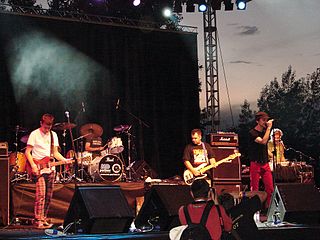
Obojeni Program is a Serbian alternative rock band from Novi Sad. The band are pioneers of the Serbian alternative rock scene. The first letters of the band's first seven studio albums form an acronym of their home town. They have performed at every Exit festival since the first in 2000.

Šarlo Akrobata were a seminal Serbian new wave/post-punk band from Belgrade. Short-lived but extremely influential, in addition to being one of the most important acts of the Yugoslav new wave scene, the three piece left an indelible mark on the entire music scene of former Yugoslavia.

Artistička radna akcija is a new wave and punk rock compilation album released in 1981 by Jugoton in SFR Yugoslavia. It presents a snapshot of the early 1980s Belgrade underground music scene through bands Radnička Kontrola, Bezobrazno Zeleno, Profili Profili, Defektno Efektni, Urbana Gerila, Petar i Zli Vuci, U Škripcu, Pasta ZZ, VIA Talas and TV Moroni, all of whom took part in the compilation as means of showcasing their material to a wider audience.

Urbana Gerila was a former Yugoslav punk rock and new wave band from Belgrade. The band is notable as the participant of the Artistička radna akcija project in 1981. In 1982, the band members formed an ad hoc group Berliner Strasse, influenced by post-punk and krautrock, performing songs with lyrics in the German language.

Električni Orgazam is a Serbian rock band from Belgrade. Originally starting as a combination of new wave, punk rock and post-punk, the band later slowly changed their style, becoming a mainstream rock act. They were one of the most notable acts of the former Yugoslav rock scene.

Nebo je malo za sve is the debut studio album from Serbian and former Yugoslav hard rock band Kerber, released in 1983.

Osvajači were a Serbian and former Yugoslav hard rock/heavy metal band from Kragujevac.

Koza nostra is the tenth studio album from Serbian and former Yugoslav rock band Riblja Čorba, released in 1990.
Kokan Popović is a Serbian drummer notable for playing in bands Idoli and Propaganda.
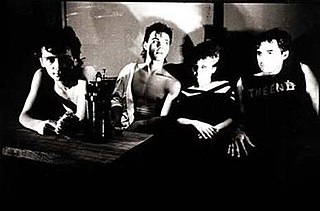
Luna was a Serbian and former Yugoslav post-punk/gothic rock band from Novi Sad.
Pasta ZZ was a former Yugoslav new wave band from Belgrade, notable as participants in the Artistička Radna Akcija project in 1981.
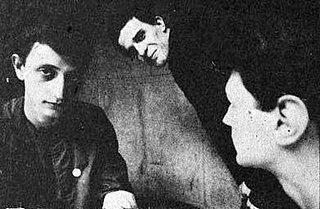
Profili Profili was a Serbian and former Yugoslav new wave/experimental music duo from Belgrade, notable as the participant of the Artistička radna akcija project in 1981. During the same year the band members formed another band Kazimirov Kazneni Korpus and both bands appeared on their split album which is the first album in Yugoslavia to be released under an independent record label.
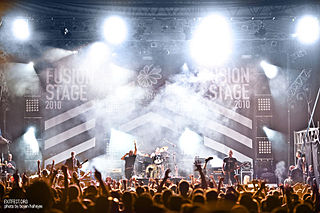
Ritam Nereda is a Serbian and Yugoslav oi!/punk rock band from Novi Sad.

Supernaut is a Serbian alternative rock band from Belgrade.

Jarboli is a Serbian alternative rock band from Belgrade.
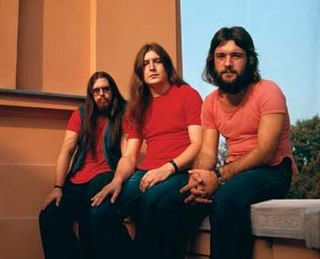
Pop Mašina was a Yugoslav progressive rock band from Belgrade. Pop Mašina was formed in 1972, and released two studio albums and one live album before disbanding in 1978. After Pop Mašina disbanded, the band's former members formed a short-lasting hard rock band Rok Mašina.

Doktor Spira i Ljudska Bića was a Serbian new wave/alternative rock band from Belgrade.

Opus was a Yugoslav progressive rock band from Belgrade.


















